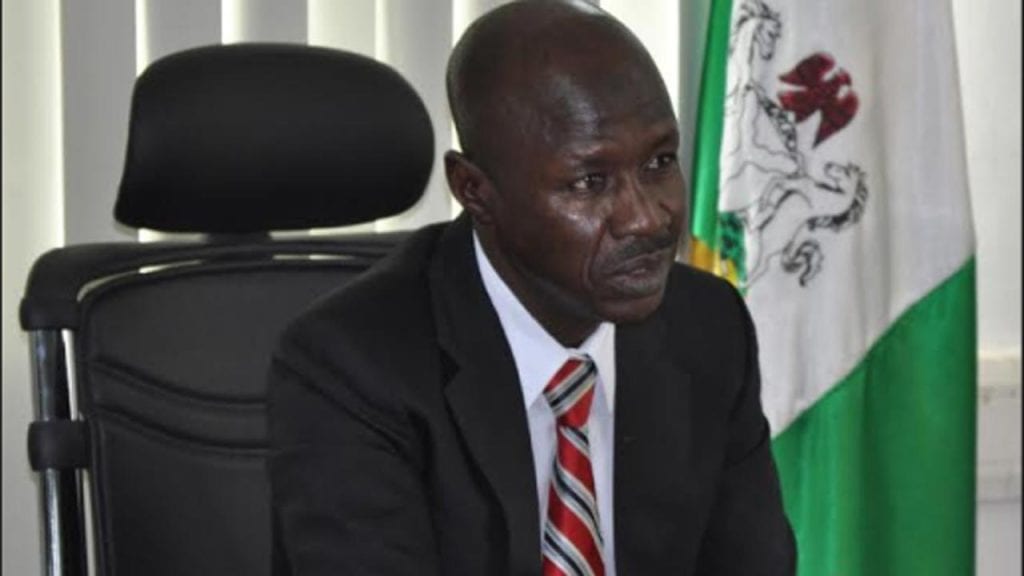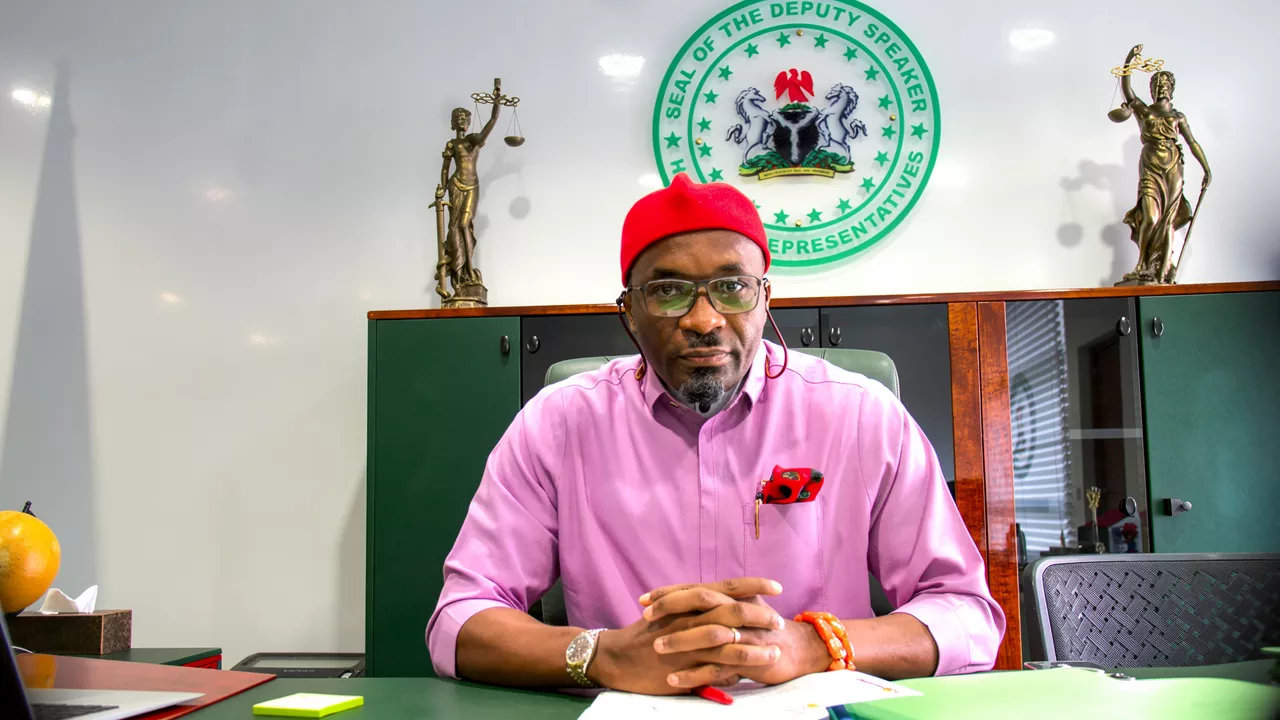
It doesn’t rain but it pours. That saying captures the recent moves by Nigeria´s Attorney General of the Federation (AGF) and Justice Minister, Abubakar Malami, against the continued stay in office of Ibrahim Magu as the Acting Chairman of Economic and Financial Crimes Commission (EFCC). Although this is not the first time Magu has been subjected to doubts about his integrity and probes, his recent travails have elicited one question on the lips of most Nigerians: Will Magu survive this time around?
The first time the EFCC acting chairman came under public and presidential scrutiny was in 2016, when he was accused of corruption. Recall also that the 9th Senate under the leadership of Dr. Bukola Saraki flinched from clearing Magu to be appointed the substantive chairman of the anti-graft body.
However, while the Senate´s action was viewed as part of the mind games between its leadership and the presidency, Magu stepped into hot water when allegations became rife that he was being less than transparent in the handling of recovered loots from corrupt politicians.
Coming at a time that the former Secretary to the Government of the Federation (SGF), Babachir David Lawal, was also being accused of using a company in which he had interests to siphon money from the Presidential Initiative for North East (PINE), President Muhammadu Buhari was invariably accused of partiality in the fight against corruption.
In the bid to clear the president of any such duplicity, the presidency in a statement by the Senior Special Assistant to the President on Media and Public Affairs, Mallam Shehu Garba, disclosed that an investigation had been ordered into the allegations against Magu and Lawal.
While emphasizing that none of them would escape prosecution if found liable, Shehu had stated: “The attention of the presidency has been drawn to a number of reports in the media, in which various accusations of corruption have been leveled against some top officials in the administration.
“In that regard, President Buhari has instructed the Attorney General of the Federation to investigate the involvement of any top government officials accused of any wrong-doing.”
Either on account of the power play in the presidency and between the presidency and the National Assembly, or for the belief in certain quarters that the EFCC under Magu had been programmed to play some roles in President Buhari´s imminent re-election, while Lawal fell, Magu survived.
As if he was destined to overcome the huddles placed on his path as the nation´s anti-graft czar, the then Director General of the Department of State Security (DSS), Lawal Mamman Daura, under whom the security report upon which the Senate anchored its decision not to clear Magu, was also removed.
And, as the build up to the 2019 election gained momentum, the acting chairman of EFCC continued in office, so much so that he delved into targeting perceived politicians opposed to President Buhari´s second term. Opposition politicians continued to cry out that the EFCC under Magu had become an attack dog of the governing All Progressives Congress (APC). The EFCC acting chairman was once accused of adorning the campaign pin-up of President Buhari´s re-election on the lapel of his jacket.
Within a short period of time, particularly at the height of the threat by the EFCC to investigate Senator Adeleke for examination malpractices, a list of Magu´s one-sided approach to the anti-corruption started making the rounds. Some of the instances of Magu´s selective approach to the fight against graft included failure to pursue a former Nigeria National Petroleum Corporation’s (NNPC) boss, Mr. Andrew Yakubu, after he was arrested for corruption by EFCC and N39 bilion ($9.7m and £74000) recovered from his home.
It was generally believed that Mr. Yakubu, who has visible social presence in Kaduna, is a strong supporter of Buhari. That in addition to the N49 million discovered in sacks in Kaduna Airport, which was neither investigated nor explanation given as to who kept the money such manner, put shadows around Magu´s EFCC.
Similarly at a time Magu was also accused of conducting media trials of opposition politically exposed persons, the discovery of $448 million hidden in a shopping plaza in Lagos by EFCC, without further information on the owner of neither the plaza nor the money sustained the hallow of doubt on his tenure.
Other ‘audio’ EFCC exploits included the $43 million that was discovered in Osbourne Towers in Ikoyi, which has remained a mystery, just as reports has it that the whistleblower was never paid a kobo. Also, EFCC under Magu celebrated the discovery of millions of dollars hidden in a graveyard, without supplying further clarifications either of its efforts at unraveling ownership mystery or what happened to the money.
Then there were cases that went cold possibly on account of the change of political orientation of the accused persons or lack of zeal in their prosecution. They include Godswill Akpabio and his indictment for allegedly stealing N180 billion, Senator Adamu Abdullahi, who was facing charges for misappropriating N15 billion.
APC’s national chairman, Adams Oshiomhole, who was indicted for $55 million in bribery, was quoted as saying that any corrupt politician that finds his way to the governing party would have his sins forgiven. That may explain EFCC´s lethargy towards the following cases: Director General of National Emergency Management Agency (NEMA), Mustapha Maihaja, who was indicted for embezzling N33billion. Also the Nigeria Broadcasting Corporation’s (NBC) Director General, Ishaq Kawu, was indicted for misappropriating N2.5 billion and EFCC powerless to act on the case.
Hunting the hunter
But after almost five years of pussyfooting, the Attorney General of the Federation (AGF), Malami, in a move that amounted to hunting the hunter, in a memo, gave President Buhari reasons to sack Magu, as the acting chairman of the Economic and Financial Crimes Commission (EFCC). Malami accused Magu of a myriad of contraventions, especially “diversion of recovered loot, insubordination and misconduct”.
While alleging that Magu sold most of the assets recovered by the EFCC without the knowledge of anyone, Malami asserted that the EFCC boss “is reckless and a liability to the anti-corruption war. There are discrepancies of figures concerning the recovered assets,” adding that Magu was not transparent enough in the management of the recovered assets.
For instance, the AGF stated that while the EFCC boss disclosed a total naira recovery of N504 billion, he lodged N543 billion in the Recovery Account with the Central Bank of Nigeria (CBN).
PDP joins the fray
The opposition Peoples Democratic Party (PDP) joined the refrain to indict the presidency of hypocrisy, adding that the AGF´s memorandum to President Buhari comes as a national embarrassment.
In a statement by its National Publicity Secretary, Kola Ologbondiyan, PDP stated: “It is the worst national embarrassment in the history of Nigeria, that the head of anti-corruption agency in an administration that prides itself on zero tolerance for corruption, “is being dragged on allegation of diversion of recovered funds and fraudulent sale of assets seized by the agency.”
PDP wondered why President Buhari had to insist on retaining Magu despite monumental instances of lack of capacity and integrity issues raised against the acting EFCC boss.
The opposition party remarked that with the AGF´s allegation of diversion of recovered funds against Magu, “the acting EFCC chairman has lost all moral rectitude to preside over our nation’s anti-corruption agency to investigate and prosecute others until he comes clean of these horrible allegations.”
An anti-corruption crusader, Godwin Oboh, had crossed words with Magu when he alleged that the EFCC chairman was engaging in shady transactions, especially concerning the amount of funds and profile of assets recovered by the commission. However in 2015, shortly after his appointment as the acting chairman of EFCC, Magu told journalists in Lagos that he would be guided in prosecuting his assignment by three things, namely fear of God, transparency and the rule of law.
He had stated that as one of the pioneer 32 staff of EFCC at inception, he swore to fight corruption with the last blood in him, stressing that corruption should be seen as the worst enemy on Nigeria´s development.
As the books are about to be opened, would Magu be seen as having played according to the rules or has he served his own purposes while chasing the scoundrels? Calls have been made to withdraw prosecutory powers from the EFCC. Perhaps the impending inquest might lead to the much-needed reforms being advocated by stakeholders for the EFCC.






